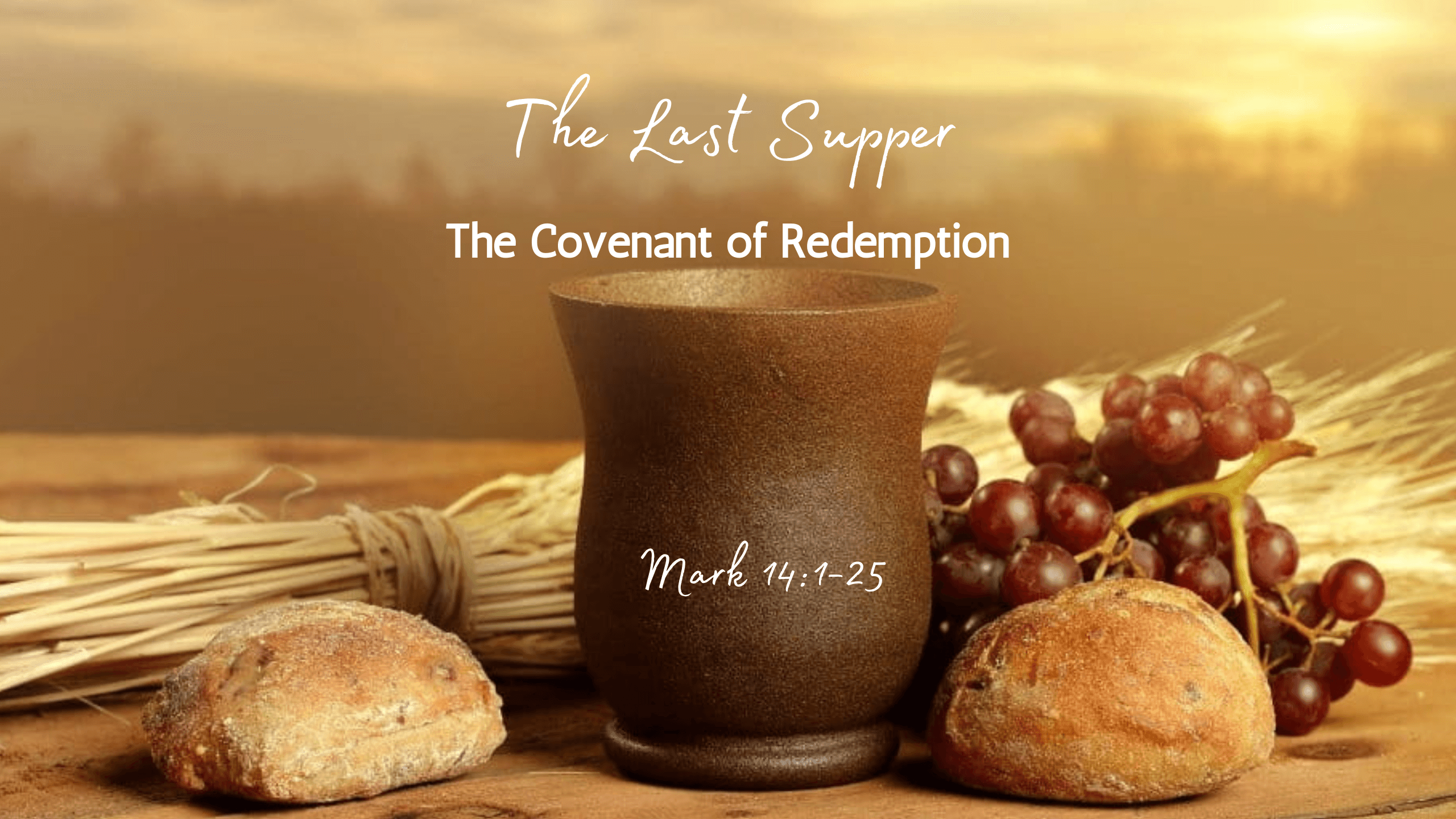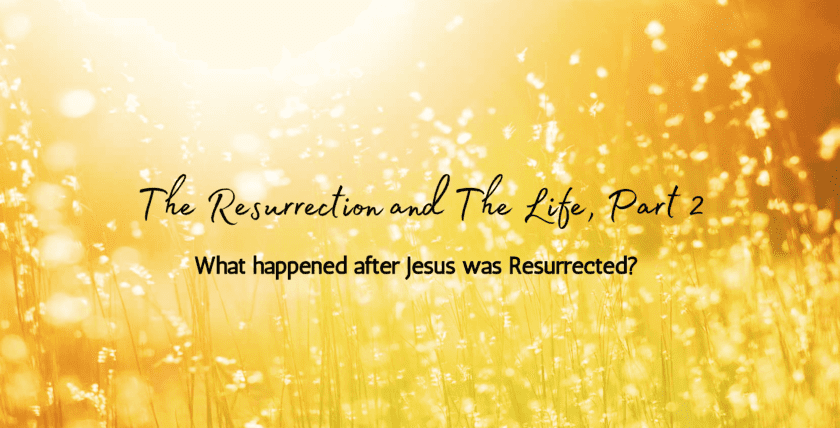In this episode, we’re going to look at The Last Supper in Mark 14:1-25.
With Easter coming up I want to turn our attention to the things surrounding Easter and maybe some things we take for granted. We’re probably all familiar with what happens leading up to the arrest, trial, and death of Jesus. We kind of focus on the drama going on around Jesus. We all like good dramas.
But sometimes when we’re watching a drama, we’re so wrapped up in the drama happening that we miss the obvious point of the story. Example; 6th Sense.
There’s a significant point in the drama that Mark tells about the Last Supper that I want us to see, maybe for the first time. So to get to that point, let’s begin with the dramatic background to the story of the Last Supper.
In ACT 1, Mark begins with the backdrop of Mark 14:1-11;
Jerusalem is overflowing with crowds who have come there for Passover and the Festival of Unleavened Bread. Think of it like New Orleans for Mardi Gras. The priests and lawyers are desperate to have Jesus arrested and they now want him dead, but they don’t want to cause a riot with so many people around. In the meantime, Jesus attends a dinner in Bethany, a suburb of Jerusalem, given by Simon, whom Jesus healed of leprosy. At the dinner, Mary Magdalen pours expensive perfume on the head of Jesus, which upsets the disciples, especially Judas. They say the perfume could have been sold and the money given to the poor. Jesus defends Mary and says they’ll always have the poor with them if they want to help the poor, but he won’t always be with them. He also says that what Mary did was prepare his body for burial.
After this event, Mark says Judas went to the priests to agree to turn Jesus over to them. Maybe it was his motive, and maybe not. In any event, there’s a lot of drama.
Mark moves on from the plan to arrest Jesus to ACT 2, the preparations by the disciples for the Passover meal with Jesus in Mark 14:12-16.
The central point of the passage for us to understand is the meaning of {Passover} and the Festival of Unleavened Bread.
- 430 Years of Slavery; God raised Moses to lead Israel to the land God promised Abraham, Isaac, and Jacob.
- Demonstration of Signs and wonders; To begin with Moses asked Pharoah for 3 days off to worship God.
- Nine Plagues; Plagues of locusts, flies, frogs, boils, disease, hail, and darkness.
- The 10th Plague; Firstborn of every household without the blood of the lamb on the doorposts.
As a memorial, Passover would be observed on the 15th day of the first month of the year and the Festival of Unleavened Bread was observed for five days following Passover. Again, a lot of drama surrounded the memorial celebration of Passover and the Festival of Unleavened Bread.
This brings us to ACT 3, The Betrayal {Mark 14:17-21}
When evening came, Jesus arrived with the twelve. While they were reclining at the table eating, he said, “Truly I tell you, one of you will betray me – one who is eating with me.” They were saddened, and one by one they said to him, “Surely you don’t mean me?” “It is one of the Twelve,” he replied, “one who dips bread into the bowl with me. The Son of Man will go just as it is written about him. But woe to that man who betrays the Son of Man! It would be better for him if he had not been born.”
Again, because of our love for a good drama, we get all wrapped up in the suspense of who will be the one who betrays Jesus. Not so suspenseful for us because we’ve already seen the end of the movie, but to anyone reading Mark’s Gospel for the first time, there’s some mystery. Certainly, it was a mystery to the disciples. Each one of them wasn’t sure it wasn’t them. I would have thought rather than their question being, “Is it me?” that it would have been “Who is it?” Why is this? First let’s look at why the betrayal happened, and then why no one knew who it could be. Why did the betrayal happen? Because it was the Father’s plan.
- {Psalm 41:9} Even my close friend, someone I trusted, one who shared my bread, has turned against me.
- {Psalm 109:2} For people who are wicked and deceitful have opened their mouths against me; they have spoken against me with lying tongues.
- {Zechariah 11:12} “If you think it best, give me my pay; but if not, keep it.” So they paid me thirty pieces of silver.
Centuries before the birth of Jesus there was a prophecy about the life, circumstances, and death of the Messiah. But all the prophecies were misinterpreted by the rabbis and priests. But this was foreknown by God, and this is why the fulfillment of prophecy is unavoidable.
Jesus chose Judas as a disciple and he knew what would happen he said nothing and or did nothing because he was following the will of the Father. Prophecy would be fulfilled on every level but not because of destiny but by choice. Judas made the decision to betray Jesus. God foreknew he would make that decision, but it was still up to him to do it.
The priests could have arrested Jesus, tried him in their court, and stoned him for being a false prophet. But they didn’t want to be blamed by the people for his death. They wanted Rome to be responsible so the people would be upset with them. God foreknew this also. There was no prophecy of the Messiah being stoned. The prophecy was for him to be crucified. The priests made the choice, it wasn’t their destiny. But the Father foreknew the choice they would make. The prophecy of the crucifixion of the Messiah was made centuries before Rome existed and crucifixion was a Roman invention.
There are over 100 prophecies regarding the Messiah;
Isaiah 53, Psalm 22, Zechariah 9:9, Zechariah 11:12-13; Judas returns the 30 pieces of silver. Zechariah 12:10; pierced with nails, Zechariah 13:7; Strike the Shepherd and the sheep will scatter. The prophecies of Zechariah are 500 years before Jesus. Psalm 16:9-10; The Messiah will not be abandoned in death, and he will not see decay, Psalm 31:5; Jesus commits his Spirit to God, Psalm 34:20; none of his bones were broken.
What’s important for us to take away from this drama of the betrayal is even though Jesus Knew exactly how everything would play out, he submitted completely to God’s plan. The other important for us to always remember is even though God knows the end before the beginning, we still make the decisions that get us to those ends.
This brings us to the final act of the Last Supper drama. ACT 4, happens in Mark 14:22-25 The Institution of a New Covenant;
Here is the final scene of The Last Supper of Jesus, what should we take away? Should we take away that Jesus initiated a memorial meal to remember how he gave us his body and his blood for our salvation? Yes, that’s one takeaway. The sharing of the bread and wine of communion with Jesus is important. In fact, it is so critical to our spiritual and physical health as Paul says in 1 Corinthians 11:28.
But there is another even more critical thing that Jesus does before the close of the Last Supper. The Last Supper was instituting the “Testament” of Jesus, and the “Covenant” of Christ. The New Covenant; {Mark 14:24}
{Diatheke} contract, Testament, Will.
In the Old Testament God made a covenant with Abraham and then the Mosaic Covenant with Israel when they were freed from Egypt and received the Law. A covenant is an agreement between two “living parties” to do what is prescribed in the agreement. In the old testament, covenants required a blood oath to seal them.
A “will” of “testament” is an agreement about what happens when the “testator” dies for their heirs.
So we see that when someone is alive, they make a “covenant”, but when someone is about to die they make a “testament”.
At the Last Supper, Jesus is doing both. He is making a “Covenant” and a “Testament”.
As the Son of God and the Son of Man, Jesus is both God and man.
1 Corinthians 11:23-25
For I received from the Lord what I also passed on to you: The Lord Jesus, on the night he was betrayed, took bread, and when he had given thanks, he broke it and said, “This is my body, which is for you; do this in remembrance of me.” In the same way, after supper he took the cup, saying, “This cup is the new covenant in my blood; do this, whenever you drink it, in remembrance of me.” For whenever you eat this bread and drink this cup, you proclaim the Lord’s death until he comes.
In this passage, we have the Lord’s death and his coming again. He is both dead and alive.
At the death of Jesus the “Testament” is in place for the inheritance to the beneficiaries. That inheritance is our salvation through faith in his sacrifice for our sins. That is the “Testament” or “Will” – The Gospel of Jesus Christ.
As for the Covenant, the writer of Hebrews says in {Hebrews 9:15-17};
For this reason, Christ is the mediator of a new covenant, that those who are called may receive the promised eternal inheritance – now that he has died as a ransom to set them free from the sins committed under the first covenant.
The Covenant or Promise made to the living by the Living Christ at the time of his coming is our resurrection and eternal inheritance in heaven.
In the case of a will, it is necessary to prove the death of the one who made it, because a will is in force only when somebody has died; it never takes effect while the one who made it is living.
So every time we come together for the Lord’s Supper, we are proclaiming his death – until he comes back (alive). Therefore his death put his testament into effect and his return initializes the Coventry Inheritance.


